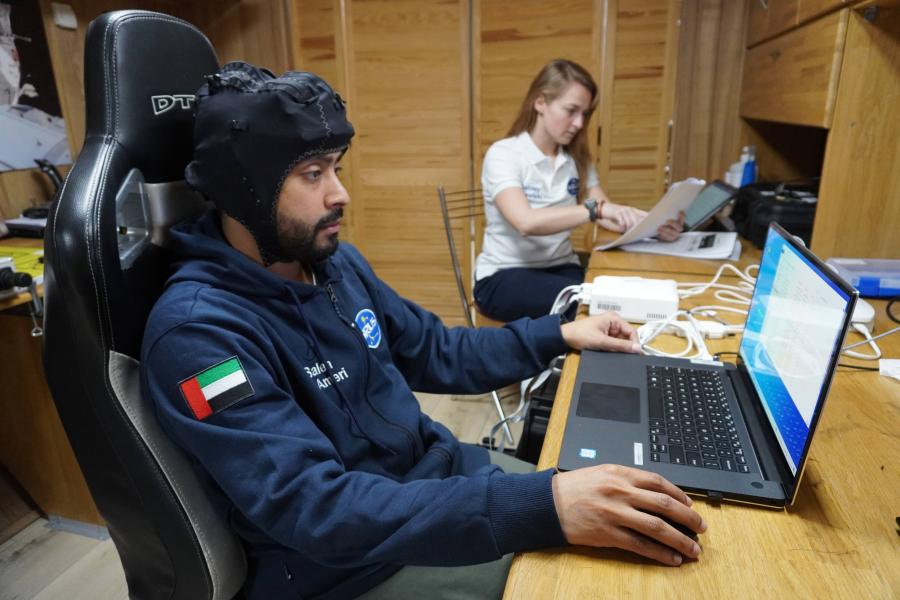- About
- Admissions
- Study at AUS
- Prospective Students
- Bachelor's Degrees
- Master's Degrees
- Doctoral Degrees
- Admission Publications
- International Students
- Contact Admissions
- Grants and Scholarships
- Sponsorship Liaison Services
- Testing Center
- New Undergraduate Student Guide
- New Graduate Student Guide
- File Completion
- New Student Orientation
- Payment Guide
- Executive Education
- Students with Disabilities
- Academics
- Life at AUS
- Research
- Contact Us
- Apply Now
- .

AUS researchers collaborate with MBRSC to investigate impact of isolation on astronauts’ mental stress
A research team from American University of Sharjah (AUS) investigated the impact of isolation and confined environments on astronauts and provided recommendations on protecting their mental health as part of a collaboration with the Mohammed Bin Rashid Space Centre (MBRSC).
The study involved six primary crew members including Saleh AlAmeri representing the UAE, who were put into a confined environment for 240 days from November 2021 to July 2022 in the SIRIUS facility, during which they experienced simulated long-distance space travel. A backup crew that supported the primary team from the operations center was present, which also included Abdalla AlHammadi from the UAE.
The AUS research team used advanced brain imaging modalities such as electroencephalography, functional near-infrared spectroscopy, alpha amylase biochemical marker and behavioral responses to measure brain electrical activity, blood oxygenation and stress hormone levels. Based on data collected at different stages, the team found an increase in the level of the stress hormone the longer the isolation continued, and a significant decrease in information flow and direction between brain regions, indicating a drop in cognitive abilities due to elevated mental stress.
“The findings of this research will impact future space missions locally and internationally. They will help develop techniques to mitigate stress at its early stages to protect astronauts’ mental health. An additional advantage of this study is applying the findings to our modern-day life in managing workplace environments to reduce the risk of mental stress, leading to an improved quality of life,” said Dr. Hasan Al-Nashash, Professor in Electrical Engineering at AUS.
The study was conducted by Dr. Al-Nashash along with Dr. Fares Al-Shargie, a visiting postdoctoral scholar, and Dr. Usman Tariq, Associate Professor in Electrical Engineering at AUS.
The UAE crew members were trained in the Biomedical Engineering Lab of the Neuroengineering Research Group at AUS by Dr. Al-Shargie and Dr. Al-Nashash on experiments protocol and data collection. The College of Engineering (CEN) labs are furnished with state-of-the-art equipment to conduct the training and experiments. The international crew members were trained online.
“We presented several recommendations, including the use of advanced neuroimaging and artificial intelligence for early detection of mental stress. The research findings motivated us to develop methods for reducing mental stress in confined environments using digital technologies to stimulate human senses to influence the brain in ways that prompt it to control emotions. This work does not only benefit space research but also impacts other social domains including healthcare, safety, education and quality of life,” said Dr. Al-Shargie.
The interdisciplinary nature of research, which combines electrical and biomedical engineering, reflects the quality of education offered to students at the AUS College of Engineering. As one of the most exciting branches of engineering, electrical engineering graduates have many opportunities to shape their future.
AUS offers a highly acclaimed four-year Bachelor of Science in Electrical Engineering (BSEE) degree program that is based on a solid foundation of science and mathematics. AUS is ranked among the top two (tied) in the UAE and top 300 universities globally for electrical and electronic engineering, according to QS World University Subject Rankings (2022). In keeping with the developments in the UAE and wider Middle East, AUS offers a Master of Science in Biomedical Engineering (MSBME) and recently launched a new doctoral program in biosciences and bioengineering (PhD-BSBE) that will be available for students starting Fall 2023.

